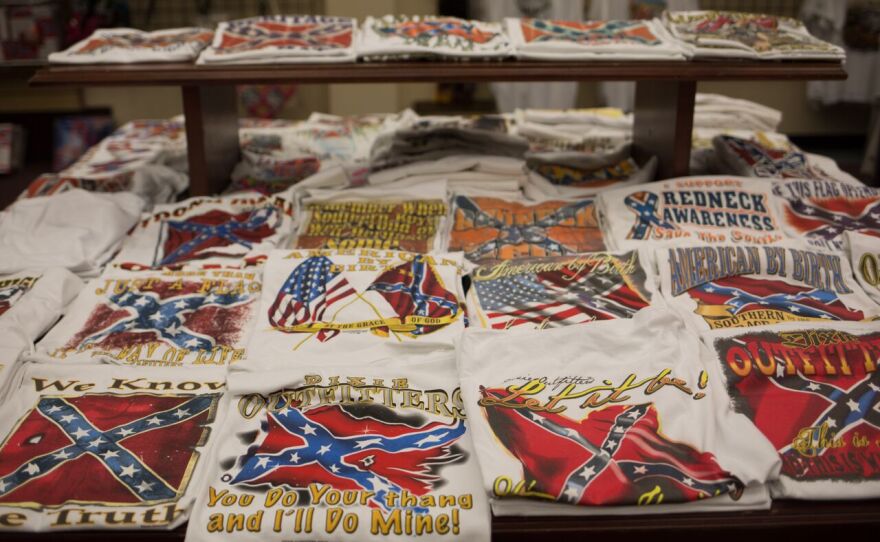Less than a week after the shootings at Emanuel AME Church in Charleston, South Carolina, Virginia governor Terry McAuliffe announced plans to remove the Confederate flag emblem from Virginia vanity license plates. The announcement was met with an outcry from some, and applause from other Virginians. WMRA’s Kara Lofton reports on differing views of the flag.
A steady stream of patrons trickled in and out of Dixie Outfitters in Harrisonburg during the hour I spent there on a recent afternoon. The store almost exclusively sells Confederate flag apparel such as bathing suits, T-shirts, underwear and jewelry. Owner Frank Hill said after the shootings, business has been booming. I asked him why he thought that was.
FRANK HILL: Some people are afraid that with everything that is going on and removing the flag from here and there and what not that there may come a time and point that you can’t get this flag again.
For Hill, the flag is his livelihood, even his lifeblood. It represents Southern pride, freedom, heritage and a way of life. It’s shocking to him that what he calls, “one little incident,” could result in the flag being removed from the license plate and other public spheres.
HILL: It’s a part of history. I mean, how can one kid change history? Other things have happened in this world and nothing gets changed…I mean look what Hitler did, you still see a Nazi flag flying, and you can buy it in the United States! You know it’s sad that some people, I’ll agree with this, that some people have used the flag with wrong intentions and in the wrong way, but that has been the small minority of them, not the majority of them.
What people now refer to as “the Confederate flag” was actually the official battle flag of General Robert E. Lee’s Army of Northern Virginia. That the flag is a part of history is undisputed. But while that history means Southern pride for Hill, for others, such as Eastern Mennonite University sophomore Clinton Ugboaga, from Gainesville, Va....
CLINTON UGBOAGA: The Confederate flag is a flag that symbolizes racism to me.
Ugboaga and his friends, fraternal twins Maleke and Jerome Jones, from Charles Town, W.Va., sat and talked with me for a while about the flag, perceptions and Southern history. They mostly expressed confusion and talked about what it is like to be young black men in a world where some people a symbol that is strongly associated with hatred for people of color.
UGBOAGA: I don’t see why racism exists…it’s kind of hard knowing you’re a black man and the world you live in, people around you just don’t like you because of your color, it makes no sense. I thought we were past that and now it just keeps coming up.
So it begs the question: for a symbol that has polarized meanings for two groups of Americans, what is the right way to use it? Is there a right way at all? Maleke Jones weighs in.
MALEKE JONES: Southern cultural history kind of just means racism to me. And I believe, if you ask most of the black people around here, you are going to get kind of the same answer…
At the same time,
JONES:I feel like if we did erase it, or like make people get rid of it, it would definitely destroy the Southern culture, history or whatever, but I guess it wouldn’t be fair to them to do that to them just to make black people happy, I guess.
His preference, though, would be to confine it to historical sites. His twin agreed - Ugboaga did not. He wanted it gone.
Grace Hale is the director of the American studies program at the University of Virginia and specializes in the history of the South. She said the one thing that confuses her the most about the flag is not regional pride, or even racism, but the continued use of a symbol that is so painful for a large portion of the population.
GRACE HALE: One of the things I find really interesting about the heritage people’s argument is why don’t they pick something else? Right? If what they are very much interested in is a kind of distinctive, regional identity – good ole boys, country living, family values, why don’t they pick something else, that’s not attached to violence, enslavement of people – the opposite of family values, selling people’s family members away from them in the slave trade, which I might add is booming in places like Virginia right up until the Civil War.
For Frank Hill, the owner of Dixie Outfitters, though, the very fact the flag is being challenged may be the reason to dig his heels in and fight to maintain the freedom to fly the flag as high as he wishes. It’s part of his cultural history that includes, in his words, separating from the North because the South was tired of being told what to do, and being proud of his own race and history. He claims selling the flag doesn’t make him racist even if others call him that.
HALE: You often hear the phrase by people who are pro-Confederate flag that it is heritage not hate. But the heritage is a heritage of creating, supporting and extending white supremacy, and I think that it’s not inaccurate to call that process hate. But white superiority, white supremacy, as opposed to equal rights for whites and blacks and that is what the flag has been used for over the last 150 years.





